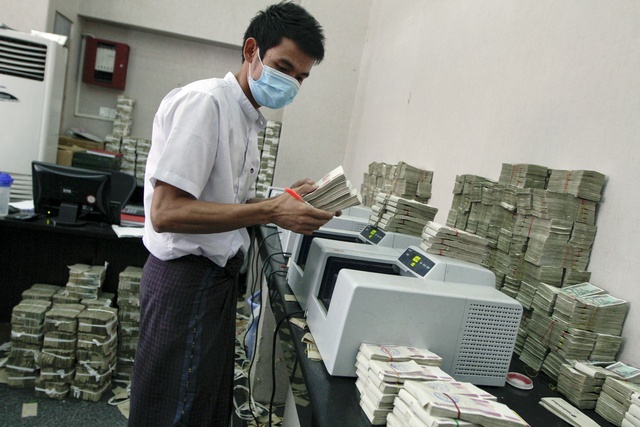FROM THE DVB NEWSROOM
The United States Department of the Treasury sanctioned the Burmese military regime’s Ministry of Defense as well as two state-owned banks on June 21. The banks, Myanmar Foreign Trade Bank (MFTB) and Myanma Investment and Commercial Bank (MICB), oversee much of the foreign currency exchange in Burma as well as facilitate financial transactions between the military regime and international markets. According to a statement released by the Treasury Department, some of the transactions are used to purchase and import arms as well as related military equipment. “Burma’s military regime has leveraged state-run access to international markets to import weapons and materiel, including from sanctioned Russian entities, to continue its violence and oppression. We will continue to support the people of Burma and deny the regime access to the means to perpetuate ongoing atrocities,” said Brian E. Nelson, the Under Secretary of the Treasury for Terrorism and Financial Intelligence.
The statement claimed that state-owned financial institutions have allowed the regime to convert U.S. dollars and Euros to Burmese Kyat. It also stated that these conversions allowed the Myanma Oil and Gas Enterprise (MOGE), a state-owned company that generates much of the military’s foreign currency reserves, access to international markets using offshore accounts that allow easier transactions with foreign banks. The U.S. government alleged that the Ministry of Defense has imported at least $1 billion USD worth of goods and materials since the 2021 military coup. American citizens will not be allowed to do business or make financial transactions with the sanctioned entities. Property and interests owned by sanctioned individuals are to be blocked and must be reported to the U.S. Treasury Department.
The sanctions were welcomed by human rights activists and the National Unity Government (NUG). “We welcome today’s U.S. sanctions coming on Myanmar’s junta including two financial institutions that facilitate transactions between junta and foreign markets. International actors must stop junta using forex and block their revenue flows such as oil and gas sector,” said Duwa Lashi La, the acting NUG President. Burmese democracy activist Thinzar Shunlei Yi called it “a crucial step to limit [the] junta’s financial power and [to] protect the people.” Others questioned why the sanctions took so long to implement. “U.S. Treasury Department hits Myanmar Foreign Trade Bank and Myanmar Investment and Commercial Bank with sanctions — at long last! Very welcome, but why did it take this long to take this very obvious step?” wrote Phil Robertson, Deputy Asia Director of Human Rights Watch, on Twitter.
Regime officials downplayed the significance of the sanctions. “State-owned banks offer systematic and precise banking services and, as they do not open their foreign currency accounts at the U.S.-based banks or the U.S. bank branches, they would not face any losses of currency and will continue to offer systematic payment services in trade using foreign currency,” stated the Ministry of Planning and Finance. Naypyidaw also stated that the sanctions will not affect the country’s banking sector as it also relies on private banks and local branches of foreign banks, pointing out that state-owned banks have been sanctioned by the U.S. in the past.
The regime’s foreign currency reserves have been limited since the 2021 military coup. Shortly after, U.S. President Joe Biden issued an executive order that froze $1 billion USD owned by the Central Bank of Myanmar (CBM). The plunge in value of the Kyat since 2021 has created a large demand for U.S. dollars as foreign currency shortages continue in Burma. Markets have become paralyzed due to arrests of foreign currency and gold traders. To help bolster its foreign currency reserves and fight inflation, the regime ordered all foreign currency in bank accounts held by locals be converted into Kyat on April 3, 2022. The regime has also taken actions to limit the country’s dependence on U.S. dollars by reaching deals with India and Thailand to conduct trade in local currencies.



